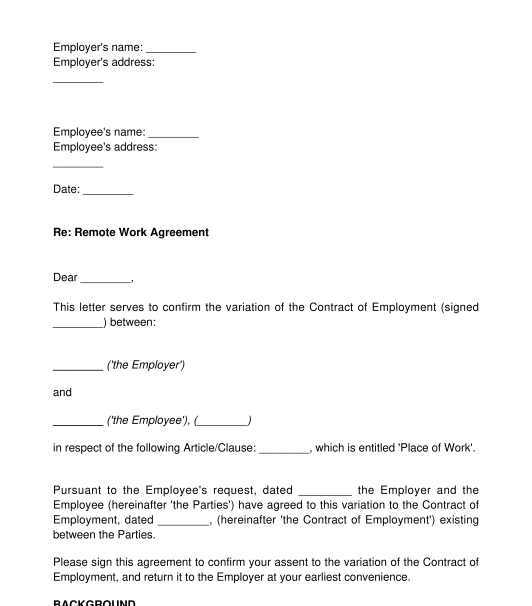
Navigating Remote Work Employment Contracts: A Comprehensive Guide
In the rapidly evolving landscape of work, remote employment has become increasingly prevalent. As organizations embrace the flexibility of remote work, it is crucial to establish clear and comprehensive employment contracts that address the unique considerations of a remote work arrangement.
Defining Remote Work Terms:
The foundation of any employment contract lies in defining the terms of remote work. This includes specifying the remote work schedule, communication expectations, and any potential requirements for periodic in-person meetings. Clear delineation of these terms sets the stage for a successful remote work relationship.
Performance Metrics and Expectations:
Remote work does not diminish the importance of setting performance expectations. Clearly outlining goals, deliverables, and performance metrics ensures that both the employer and the remote employee are on the same page. This transparency contributes to a results-oriented approach that aligns with the dynamics of remote work.
Technology and Security Protocols:
With remote work heavily reliant on technology, employment contracts should address the tools and platforms employees are expected to use. Additionally, outlining security protocols and measures helps safeguard sensitive information. This section ensures that remote employees understand their responsibilities in maintaining data confidentiality.
Communication Channels and Frequency:
Effective communication is pivotal in remote work setups. Employment contracts should detail the preferred communication channels, whether it’s email, video conferencing, or collaboration platforms. Specifying the frequency of check-ins and team meetings fosters a connected and communicative remote work environment.
Flexibility and Work-Life Balance:
One of the key advantages of remote work is the flexibility it offers. Employment contracts should acknowledge this flexibility while maintaining a balance that meets the needs of both the employer and the employee. Establishing guidelines on working hours and availability helps in maintaining a healthy work-life balance.
Compensation and Benefits:
Remote employees should have a clear understanding of their compensation structure and any additional benefits. Employment contracts should explicitly outline the salary or hourly rate, payment frequency, and eligibility for bonuses or incentives. Addressing benefits such as health insurance and retirement plans is equally crucial.
Remote Work Expenses and Reimbursement:
In remote work scenarios, employees may incur additional expenses related to setting up a home office. Employment contracts should specify the company’s policy on expense reimbursement, covering aspects like internet costs, equipment, and other work-related expenditures. Clarity on this front avoids potential misunderstandings.
Compliance with Labor Laws:
Navigating remote work employment contracts requires a keen awareness of labor laws and regulations. Contracts should explicitly state the jurisdiction under which they fall, ensuring compliance with relevant laws governing remote work, taxes, and employment rights in the employee’s location.
Termination and Exit Protocols:
Including clear termination clauses is essential for both parties. Employment contracts should outline the circumstances under which termination can occur and the associated notice periods. Exit protocols, including the return of company property and data, contribute to a smooth transition in case of termination.
Continuous Review and Updates:
The dynamic nature of remote work and the evolving business landscape necessitate continuous review and updates to employment contracts. Employers should establish a framework for periodic reviews, allowing for adjustments to terms, conditions, and expectations as needed.
In conclusion, creating robust employment contracts for remote work is a critical aspect of fostering a successful remote work environment. Employers and employees alike benefit from clear, comprehensive, and flexible agreements that adapt to the changing dynamics of the modern workplace. For more insights on navigating remote work employment contracts, visit Employment contracts for remote work.


